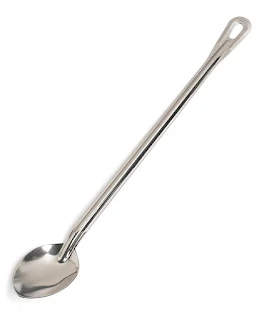Like why would you need a special spoon to brew with?
Can't you just use the wooden spoon you have from the kitchen?
Well, for one thing, wooden spoons can harbour a boatload of nasty germs that may infect your beer.
But why if you live in the modern age can't you use plastic spoons?
Well, the truth is, yes you can use any damn well spoon you like, but a quality stainless steal beer spoon as some advantages over wood and plastic.
For a start, they are the right size! Have you ever just used a shitty stirring spoon from the kitchen drawer and it just doesn't stir well because once you've added the malt and the beer enhancer, you have to reach inside the fermenter and it's just one big mess?
A proper beer brewing spoon is the right size and if it's made of steel, it's easy to clean and there will be a strongly reduced chance of it harbouring bacteria over wooden and plastic spoons. This is because those spoons get scratches in which the bugs like to make a home.
But back to size, if you are doing all grain brewing, you're probably going to be using a kettle right?
A beer brewing spoon is designed especially for fitting in kettles as they usually feature a long handle and a hook for simple storage.
These spoons can also do double duty as a basting tool which may come in handy for those that like to fry turkeys using their million BTU rated gas burners!
Here's a very popular brewing spoon that has a pretty hand rating on Amazon:
This 21" rugged, stainless steel spoon is great for stirring a mash. Its corrugated design prevents bending (which happens to cheap spoons and plastic paddles!).
If you ever wondered if a spoon needed a review, these actual users have found good things to say about this one!
"This is a restaurant utensil. It's sturdy enough and long enough to reach from the bottom to about an inch over the top of a stainless steel turkey fryer pot for stirring homebrew wort."
"Well made spoon. Much better choice than the plastic paddle I've been using."
If you think this is the spoon for you, check out the price on Amazon.
What about using wooden spoons for brewing?
You will probably never be able to fully sanitize a wood spoon because they can be so porous. While a good soak in some PBW or sodium percarbonate could be useful, a good long turn in a dishwasher on the highest setting is probably just an easier move to try and get it clean.
The history of using wood in brewing is actually quite amusing - monks and Vikings would use wooden sticks to stir their brews and kept using the same ones over and over. While they were ignorant of what yeast was, their stirring sticks retain the yeast which was imparted into the beer everytime it was us
You'll be fine using a wooden spoon if you are stirring it to stir your mash as the wort is to be boiled and that will kill any microbes that managed to transfer from spoon to wort.
So we are probably overthinking things in this regard!
Mash paddles and dough balls
Mash paddles help keep the grain from forming dough balls.
By using a well-designed spoon or paddle on your mash, you will keep the grain from forming the dreaded 'dough ball'.
No one wants a dough ball to form in the mash because it reduces the efficiency of the mash. Effectively the hot water (liqueur) is not interacting with the grains in the dough, meaning less wort is made. Which is not the point of the exercise.
To avoid dough balls forming, you should ensure that you correctly mill your grains - the finer you do them, the more chance a ball will form as the grains get sticky and can form a paste in effect.
You can also perhaps consider using rice husks in your mash, as this can help with the sparge.
A good paddle will have a hook / curved end which can be used to easily hang it when brewing.

0 comments:
Post a Comment